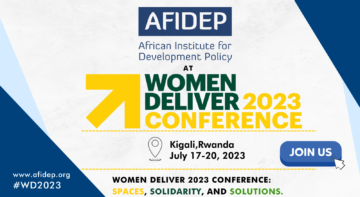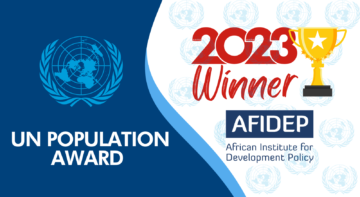News

The first Demographic Dividend Knowledge Sharing Symposium for East and Southern Africa kicked off on 24 August 2015 at the Safari Park Hotel in Nairobi, Kenya. The Symposium which is co-hosted by the National Council for Population and Development (NCPD), United Nations Population Fund Kenya (UNFPA Kenya) and the African Institute for Development Policy (AFIDEP).
The Symposium which saw the convergence of development experts from several African countries (Botswana, Burundi, Democratic Republic of Congo, Ethiopia, Eritrea, Malawi, Mozambique, Namibia, Rwanda, South Sudan, eSwatini (formerly Swaziland), Tanzania, Uganda, Zambia, and Kenya), was officially opened by the Senior Director of Administration Devolution & Planning, Mr Hassan Noor Hassan, representing the Cabinet Secretary (CS) Ministry of Devolution and Planning, Hon. Anne Waiguru.
Reading the CS’s official speech at the symposium opening, Mr Noor made reference to the recent 50th-anniversary commemoration of the African Union, where the African Heads of States and governments re-dedicated themselves to accelerate development and technological transformation across the continent.
“This aspiration is well articulated in the African Union’s Agenda 2063, which seeks to exploit all available opportunities to ensure positive socio-economic transformation of the continent by 2063. In this regard, Agenda 2063 calls on African countries to integrate demographic dimensions in all development programmes, and strengthen the link between the demographic dividend and economic growth, including promoting inclusive development. In particular, this long-term development blueprint calls for intensified investments and efforts to unleash the potential of the continent’s youth and women,” he said.
Mr Noor noted that the Demographic Dividend Knowledge Sharing Symposium for East and Southern Africa is a step in the right direction for the region and the African continent as a whole because it allows countries engaged in demographic dividend activities share their experiences and lessons learned with the aim of forging a common regional approach to the demographic dividend initiatives.
Day one of the symposium saw the sharing of experiences on the demographic dividend by various countries:- Burundi, DRC, Ethiopia, Kenya, Malawi, Mozambique, Rwanda, Tanzania, Uganda and Zambia. A common thread in the country experiences was the struggle with high fertility, unemployment and high population growth rate. However, the opportunity to harness the demographic dividend in all countries is ripe due to the large youthful population.
“We cannot ignore the youth,” noted the NCPD Director-General Dr Josephine Kibaru-Mbae in her speech. “This population group faces many challenges that threaten their future. These challenges include; early marriage and pregnancies, HIV and AIDS, drug and substance abuse, unemployment, lack of education and training, and lack of employable skills. At the same time, this is the same group of people who are expected to drive the development agenda of their countries and the continent. Given this situation of young persons in our countries, it is imperative that we tackle these challenges for the prosperity of the continent,” she emphasized.
The importance of leveraging the youthful population for socio-economic development was further emphasized by the United Nations Resident Coordinator, Siddharth Chatterjee in his remarks. “The recent Global Economic Summit held in Nairobi and which was attended by [US] President [Barack] Obama clearly showed that the youth, if given opportunities, can be at the forefront of change, innovation, and envisioning new worlds of possibilities. They are comfortable with new technologies and seek to apply that technology to solve problems in health care, education and agriculture.”
Speaking on the need for African leaders to embrace a culture of evidence-informed decision-making, AFIDEP’s Executive Director, Dr Eliya Zulu indicated that the demographic dividend paradigm provides a very unique platform for testing the extent to which this is possible.
“We can embrace this evidence-informed decision-making culture… when appropriate evidence is put together and packaged in usable formats, the end result will be the sort of phenomenal traction it has generated among our leaders ranging from President Museveni, who acknowledged the demographic dividend as the best framework for looking at the relationship between population dynamics and development. Similar sentiments have been expressed by Heads of States for Malawi and Zambia, where both President Arthur Mutharika and President Edgar Lungu have strongly supported the demographic dividend work. President Uhuru Kenyatta of Kenya and President Macky Sall of Senegal are also DD [demographic dividend] champions.”
Regional bodies at the forum such as (Intergovernmental Authority on Development )IGAD indicated that they are keen on building synergies between population dynamics and sustainable development, especially employment of youth in order to curb extremism and improve livelihoods. The East African Community (EAC) and Common Market for Eastern and Southern Africa (COMESA) also underscored the need for concerted efforts to harness the demographic dividend in the region. EAC called for the harmonisation of a regional population policy framework as the need for reliable regional data is critical. COMESA called for strengthening of the knowledge base of countries to ensure a strong policy framework in the region.
The three-day Symposium’s main objective is to set up a knowledge-sharing platform that will enable sustained sharing of experiences for harnessing the demographic dividend in the East and Southern Africa region and enhance cross-country synergies for its realisation.
Related Posts





